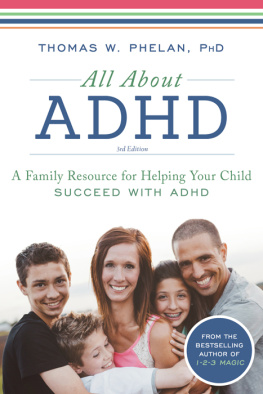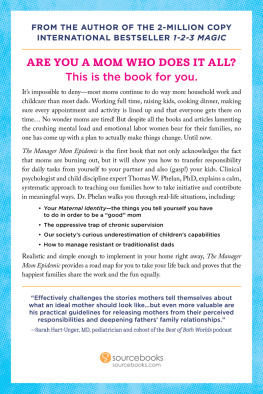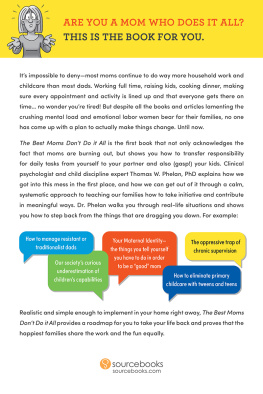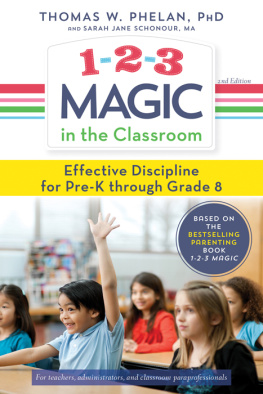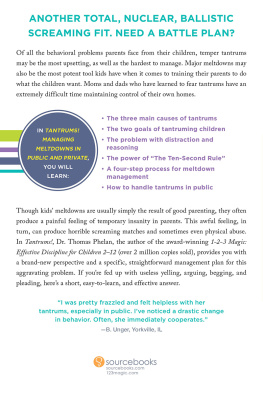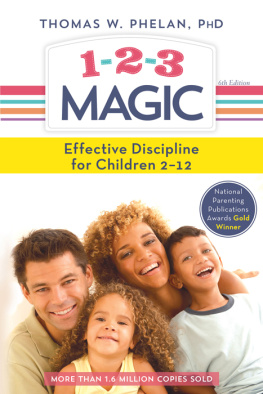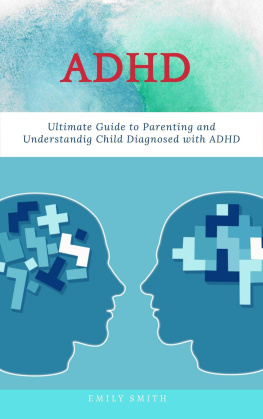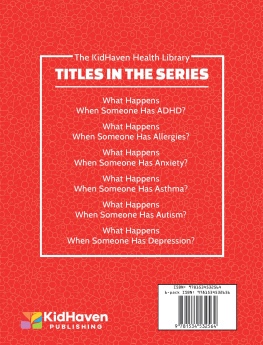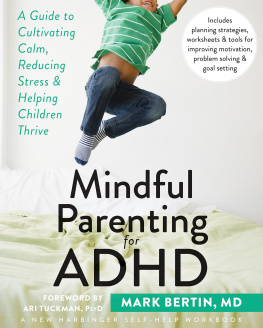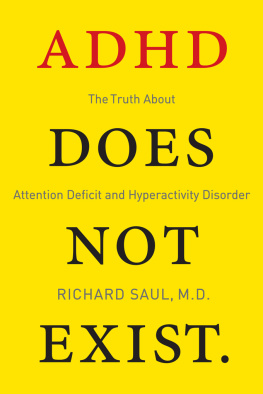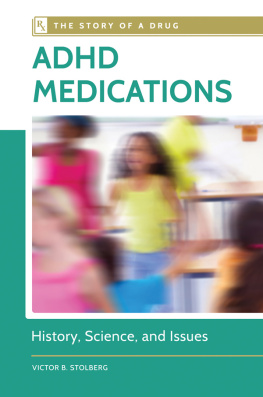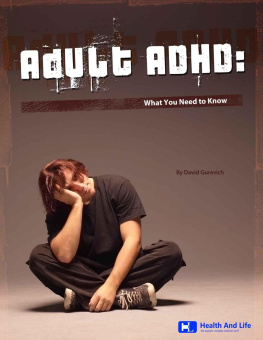Copyright 2017 by ParentMagic, Inc.
Cover and internal design 2017 by Sourcebooks, Inc.
Cover design by Erin Seaward-Hiatt
Cover images/illustrations Rob & Julia Campbell/Stocksy
Sourcebooks and the colophon are registered trademarks of Sourcebooks, Inc.
All rights reserved. No part of this book may be reproduced in any form or by any electronic or mechanical means including information storage and retrieval systemsexcept in the case of brief quotations embodied in critical articles or reviewswithout permission in writing from its publisher, Sourcebooks, Inc.
This publication is designed to provide accurate and authoritative information in regard to the subject matter covered. It is sold with the understanding that the publisher is not engaged in rendering legal, accounting, or other professional service. If legal advice or other expert assistance is required, the services of a competent professional person should be sought. From a Declaration of Principles Jointly Adopted by a Committee of the American Bar Association and a Committee of Publishers and Associations
This book is not intended as a substitute for medical advice from a qualified physician. The intent of this book is to provide accurate general information in regard to the subject matter covered. If medical advice or other expert help is needed, the services of an appropriate medical professional should be sought.
Published by Sourcebooks, Inc.
P.O. Box 4410, Naperville, Illinois 605674410
(630) 9613900
Fax: (630) 9612168
www.sourcebooks.com
Originally published as All About Attention Deficit Disorder in 1996 by ParentMagic, Inc.
Library of Congress Cataloging-in-Publication Data
Names: Phelan, Thomas W., author.
Title: All about ADHD : a family resource for helping your child succeed with ADHD/Thomas W. Phelan, PhD.
Description: Naperville, Illinois : Sourcebooks, [2017] | Includes bibliographical references and index.
Identifiers: LCCN 2016053260 | (pbk. : alk. paper)
Subjects: LCSH: Attention-deficit hyperactivity disorder--Treatment. | Attention-deficit-disordered youth--Treatment. | Attention-deficit-disordered children--Treatment.
Classification: LCC RJ506.H9 P524 2017 | DDC 618.92/8589--dc23 LC record available at https://lccn.loc.gov/2016053260
CONTENTS
INTRODUCTION
ATTENTION-DEFICIT/HYPERACTIVITY DISORDER (ADHD) IS a chronic condition in which core symptoms of excessive inattentiveness, impulsivity, and hyperactivity cause significant impairments in a persons school, work, social, and home life. ADHD is a challenge for families, schools, and society for a number of reasons.
The prevalence of ADHD in children in the United States averages between 5 percent and 7 percent, while in adults, the prevalence is about 3 to 5 percent.
ADHD strongly impacts families, and ADHD runs in families. About half of all mothers with children diagnosed with ADHD have experienced clinical depression. Parents with children with ADHD are more likely to experience marital conflict, separation, and divorce. Siblings of children with ADHD often feel mistreated and neglected, and they themselves are also at higher risk for ADHD as well as other problems. Because ADHD has a strong genetic component, it is very common for families to have several children and adults with ADHD living under the same roof.
The prevalence, complexity, and negative impact of ADHD are the bad news. The good news is that reliable, useful, and scientifically accurate information about ADHD has become more and more widespread. More and more, children with ADHD are being properly diagnosed and treated. More classroom teachers are being trained to understand and manage ADHD, producing corresponding benefits to children with the disorder, their classmates, and to the teachers themselves. Fewer parents these days, as opposed to a decade or more ago when less was known about the disorder, believe the myth that they somehow caused ADHD in their children due to bad parenting or argue about which one messed up this kid. ADHD is now understood as a neurological, genetic, and treatable condition, not an indication of failings within the family. Many parents of children with ADHD and many adults with ADHD greet the diagnosis with some relief. They are glad to learn the problem has a name, that it is not their fault, that mental health experts know a lot about this condition, and that a course of management/treatment can be defined.
Further benefits have come from the recognition that most kids with ADHD do not outgrow their symptoms, which has led to diagnosis and effective treatment for many adults as well as to useful accommodations for college students with the disorder and affected employees in the workplace.
A diagnosis, however, is not magic, and it is only the beginning of the usually lifelong process of dealing with the symptoms of ADHD. The most important part of the treatment process is education about ADHD. Thats what this book is about. You may be a parent trying to deal with your childs first-grade teacher, discussing medication for your son with a pediatrician, attempting to explain the disorder to the grandparents, or trying to manage your own periodic depression. Or you may be an adult with ADHD trying to handle a difficult job, get along with your girlfriend, or keep track of your money.
Whatever the case, you want good knowledge about ADHD to help you raise your child or to run your own life as an adult. Dependable facts are emotional gold. You need to understand basic symptoms, how these symptoms affect school, home, workplace, and peer relations, what its like to grow up with ADHD, what causes ADHD and the genetic aspect of the problem, how to predict the future (prognosis), how ADHD is diagnosed, what treatments are useful, and what treatments (though often highly touted!) are useless.
Unfortunately, information about ADHD on the Internet is too often simply distorted and idle chatter. Stories about ADHD in the media are too often sensationalized and negative, although this problem seems to be lessening. I hope All About ADHD will provide you with the latest reliable and scientific evidence about this disorderin a simple, readable formatso that you can maximize your happiness and the happiness of those you love.
All About ADHD is based on my own personal experience as a parent, grandparent, and clinical psychologist who has worked with children and adults with ADHD for over forty years. ADHD will always have a personal, family side as well as a clinical, scientific side. In my opinion, to really grasp the problem and deal effectively with it, you need to understand both.
PART I
What Is ADHD?
THREE VIEWS OF ADHD
IN THIS CHAPTER, WELL examine ADHD from three points of view: (1) ADHD according to the DSM-5 , (2) what its like to actually have or live with ADHD, and (3) ADHD viewed as fundamentally a problem of self-control.
The DSM-5 Criteria for ADHD
The American Psychiatric Associations Diagnostic and Statistical Manual of Mental Disorders (DSM) , now in its fifth edition, defines attention-deficit/hyperactivity disorder. The DSM-5 is used by physicians, mental health professionals, and insurance companies for diagnosis and treatment recommendations. According to the DSM-5 , several criteria must be met for an individual to qualify as having ADHD. Basically, the person must show a pattern of inattention and/or hyperactivity-impulsivity that fits the following criteria:

